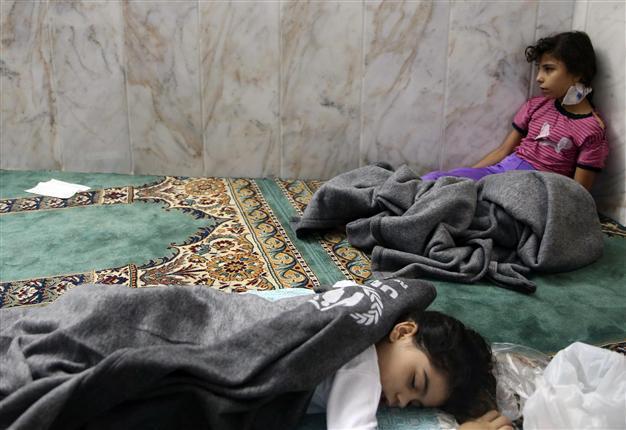Doctors Without Borders says 3,600 Syrians showed 'neurotoxic symptoms,' 355 dead
PARIS - Agence France-Presse

Girls who survived from what activists say is a gas attack rest inside a mosque in the Duma neighbourhood of Damascus Aug. 21. REUTERS photo
Around 3,600 patients displaying "neurotoxic symptoms" flooded into three Syrian hospitals on the day of reported chemical weapons attacks, and 355 of them died, Doctors Without Borders (MSF) said Aug. 24.
The victims all arrived within less than three hours of each other, and MSF director of operations Bart Janssens said the pattern of events and the reported symptoms "strongly indicate mass exposure to a neurotoxic agent."
"Medical staff working in these facilities provided detailed information to MSF doctors regarding large numbers of patients arriving with symptoms including convulsions, excess saliva, pinpoint pupils, blurred vision and respiratory distress," he said.
The statement follows allegations that as many as 1,300 people were killed in massive chemical attacks near Damascus on Aug. 21 that opposition groups say was carried out by President Bashar al-Assad's forces.
The Syrian government has strongly denied those allegations, but has yet to accede to demands that U.N. inspectors already in the country be allowed to visit the sites of the alleged attacks.
MSF provides drugs, medical equipment and technical support to the three hospitals near Damascus, which its staff have not been able to access for security reasons.
"MSF can neither scientifically confirm the cause of these symptoms nor establish who is responsible for the attack," said Janssens.
"However, the reported symptoms of the patients, in addition to the epidemiological pattern of the events - characterised by the massive influx of patients in a short period of time, the origin of the patients, and the contamination of medical and first aid workers - strongly indicate mass exposure to a neurotoxic agent."
